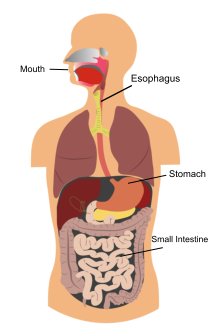Diarrhea
What is diarrhea?
 The digestive system
The digestive systemDiarrhea is frequent, loose, and watery bowel movements. Bowel movements, also called stools, are body wastes passed through the rectum and anus. Stools contain what is left after your digestive system absorbs nutrients and fluids from what you eat and drink. If your body does not absorb the fluids, or if your digestive system produces extra fluids, stools will be loose and watery. Loose stools contain more water, salts, and minerals and weigh more than solid stools.
Diarrhea that lasts a short time is called acute diarrhea. Acute diarrhea is a common problem and usually lasts only 1 or 2 days, but it may last longer. Diarrhea that lasts for at least 4 weeks is called chronic diarrhea. Chronic diarrhea symptoms may be continual or they may come and go.
What causes diarrhea?
Causes of diarrhea include
- bacteria from contaminated food or water
- viruses that cause illnesses such as the flu
- parasites, which are tiny organisms found in contaminated food or water
- medicines such as antibiotics
- problems digesting certain foods
- diseases that affect the stomach, small intestine, or colon, such as Crohn’s disease
- problems with how the colon functions, caused by disorders such as irritable bowel syndrome
Sometimes no cause can be found. As long as diarrhea goes away within 1 to 2 days, finding the cause is not usually necessary.
When should I see a health care provider for diarrhea?
You should see a health care provider if you have any of the following symptoms:
- signs of dehydration
- diarrhea for more than 2 days
- severe pain in your abdomen or rectum
- a fever of 102 degrees or higher
- stools containing blood or pus
- stools that are black and tarry
Diarrhea often goes away by itself, but it may be a sign of a more serious problem.
How is diarrhea treated?
Diarrhea is treated by replacing lost fluids, salts, and minerals to prevent dehydration.
Taking medicine to stop diarrhea can be helpful in some cases. Medicines you can buy over the counter without a prescription include loperamide (Imodium) and bismuth subsalicylate (Pepto-Bismol, Kaopectate). Stop taking these medicines if symptoms get worse or if the diarrhea lasts more than 2 days. If you have bloody diarrhea, you should not use over-the-counter diarrhea medicines. These medicines may make diarrhea last longer. The health care provider will usually prescribe antibiotics instead.
Over-the-counter medicines for diarrhea may be dangerous for babies and children. Talk with the health care provider before giving your child these medicines.
If you have any questions or wish to schedule an appointment, please do not hesitate to call the office at (706) 548-0058. Remember that we usually require that you see a primary care physician (your family doctor or PCP) before we can schedule you. If you are having a medical emergency, get medical attention immediately at your nearest healthcare provider:
Athens Regional Medical Center: (706) 475-7000
St. Mary's Hospital: (706) 354-3000
This informational material is taken from the National Digestive Diseases Information Clearinghouse, a division of the U.S. Department of Health and Human Resources.
Please see the Contact Us page for street maps.
Click here to
Request an Appointment.




